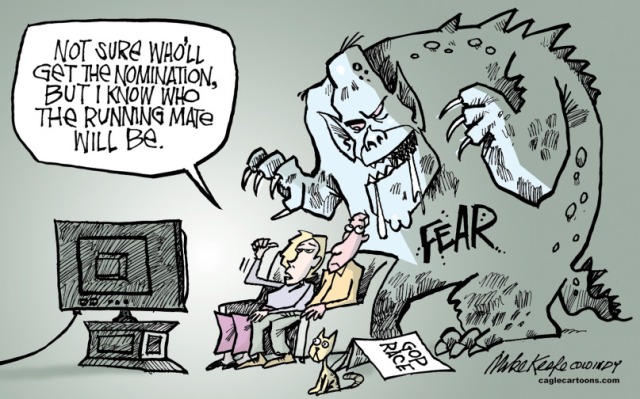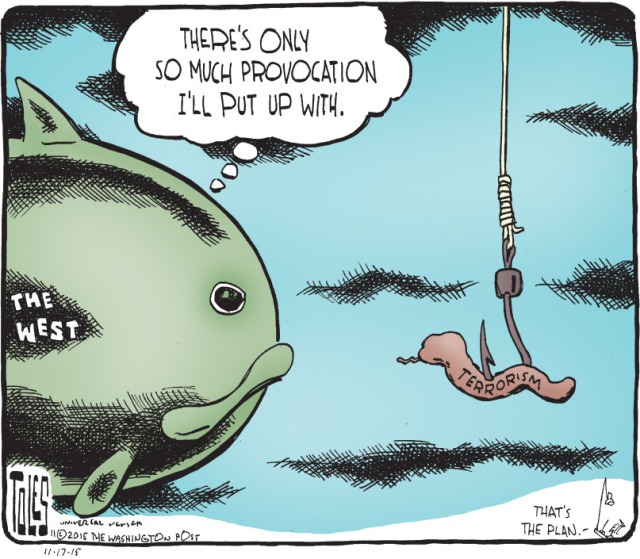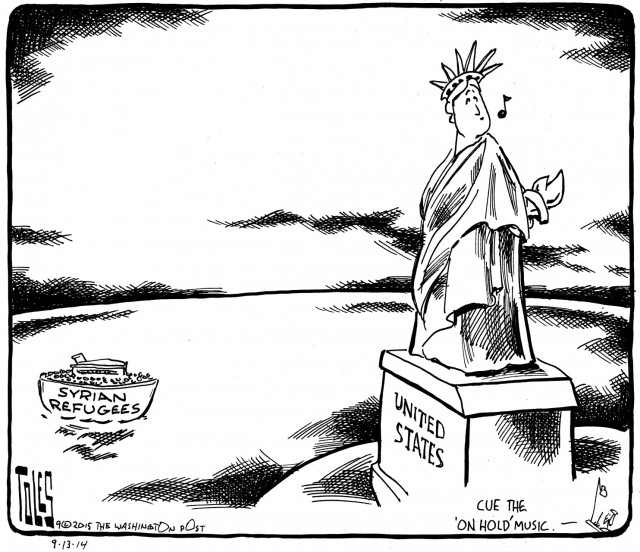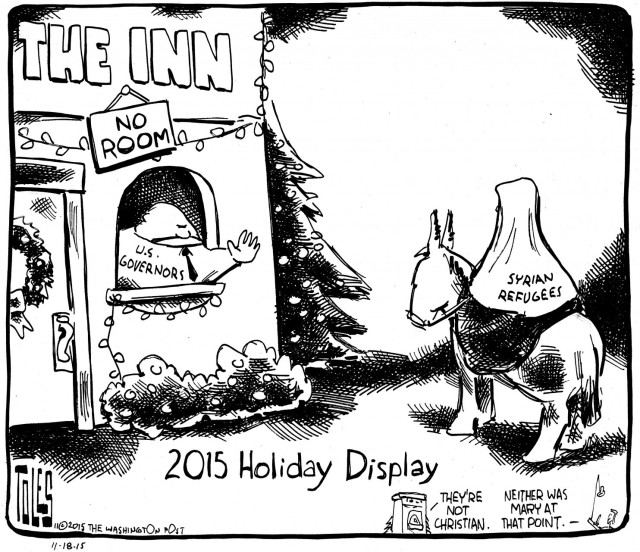
On Doing Everything We Can
When I took the oath of office, I swore to do everything I could to protect the citizens of this state from harm. There is nothing more important to me than ensuring that we are safe and can gather in our public places without fear of mass, indiscriminate violence. The nightmare scenario — the one that keeps me up at night — is the one where some individual could easily and legally obtain a firearm and use that firearm to kill innocent American citizens and also that the individual doing the killing is Syrian.
—Pete Reynolds, McSweeney’s, As your Governor, I Will Protect You From Mass Shooters If They are Syrian
Stand with Planned Parenthood
On Friday, November 27, a shooting at a Planned Parenthood clinic in Colorado Springs killed three people. Nine others were injured, and hundreds were forced to shelter in place. As of this writing, the vast majority of presidential candidates had failed to comment on the shooting. For the record, these include Jeb Bush, Ben Carson, Chris Christie, Carly Fiorina, Jim Gilmore, Lindsey Graham, Mike Huckabee, George Pataki, Rand Paul, Marco Rubio, Rick Santorum, and—almost surprisingly—Donald Trump.
Planned Parenthood is obviously a controversial organization, especially among Republicans. Abortion is, theoretically, the lightning-rod issue. But as legal scholar Reva Siegel has pointed out, most abortion restrictions are not, as their advocates claim, rooted in a defense of (potential) life. Rather, abortion restrictions are today justified primarily through gender stereotypes that emphasize sex-specific roles and constructs. Why else, for example, would legislators not impose criminal sanctions on those who seek abortions? Why else would those who campaign against abortion focus on “women’s health”? And why would those who believe aborting fetuses constitutes murder allow for an exception in the case of race or incest?
When viewed in this light, Republicans’ refusal to acknowledge Planned Parenthood’s role as a comprehensive women’s health provider makes sense.
My support for Planned Parenthood has deep roots. I value women and their health. I believe in reproductive equality. I feel strongly that, whatever my personal feelings about abortion, I have no right to impose them on others.
But I also know about the other work Planned Parenthood does. When I was 21, I was raped. The experience was—to put it mildly—fraught. My father was in the hospital with a terminal illness, I had yet to internalize the meaning of “acquaintance rape,” and I was deeply focused on my own supposed wrongdoing. But I knew, immediately, where to go for anonymous, affordable, emergency contraception and STI screening.
You can see where I’m going here.
Planned Parenthood provides birth control to women who want to practice safe sex and become parents whenever and with whoever makes the most sense for them. Republican leaders call those women sluts. Planned Parenthood provides routine gynecological care to women who may not be able to afford visits to a private practice. Republican leaders call those women welfare queens. Planned Parenthood provides safe, anonymous assistance to women who have been raped or sexually assaulted. Republican leaders think these women are a distraction.
Those who fail to speak up for Planned Parenthood are endangering the health, safety, and freedom of women throughout our country. So, to anyone who thinks they have what it takes to govern and lead: Stand with your daughters. Stand with your constituents. Stand with Planned Parenthood.
On Compassion
O ye, who revel in affluence, see the afflictions of humanity and bestow your superfluity to ease them. Say not, we have suffered also, and thence withold your compassion. What are you[r] sufferings compared to those? Ye have still more than enough left. Act wisely.
—Alexander Hamilton, 1772
What’s Past is Prologue
In November 1938, German paramilitary forces and civilians carried out one of history’s most famous pogroms. Devastation reigned. After that night, which we now know as Kristallnacht, more than 100,000 fleeing German Jews applied for American visas. Most applicants were unsuccessful, largely due to American bigotry. Less than one year later, the U.S. turned away more than 900 fleeing Jews on board the St. Louis. The ship was forced to return to Europe, where more than a quarter of its passengers were killed in the Holocaust.
In December 1941, Japan attacked the U.S. naval base at Pearl Harbor, killing over 2,400 Americans. Thee months later, President Franklin D. Roosevelt authorized the incarceration of Japanese Americans. More than 110,000 people—including at least 30,000 children—were forced into interior camps, many without any plumbing or cooking facilities. Interned families began using the phrase “shikata ga nai”—in English, “it cannot be helped”—to express their resignation to their fate.
And in November 2015, the Islamic State of Iraq and the Levant carried out near-simultaneous attacks on six sites across Paris, France. Using automatic weapons and explosive devices, the attackers killed 129 civilians. A Syrian passport was found next to one of the dead suicide bombers.
And so it goes.
Within days, 25 Republican governors pledged to block the entry of Syrian refugees into their states. Some urged the Obama Administration to stop admitting Syrians at all, and Senator Ted Cruz announced that he would introduce legislation banning Muslim Syrian refugees from entering the United States.
To be clear, the Constitution vests the federal government—not states—with power over immigration, naturalization, and deportation. And Congress itself gave the President expansive authority to handle “an unforeseen emergency refugee situation,” such as one involving “grave humanitarian concerns,” when it passed the Refugee Act of 1980.
President Obama termed efforts to prevent refugees from entering the United States “shameful.” Senator Elizabeth Warren agreed, saying on the Senate floor: “We are not a nation that delivers children back into the hands of ISIS murderers because some politician doesn’t like their religion, and we are not a nation that backs down out of fear.”
The grave of John F. Kennedy, lit in the warmth of an eternal flame, bears a quote from Aeschylus. But today, as our nation’s shoulders droop under the strain of fear, hatred, and bigotry, different words from the same Greek playwright are perhaps more instructive: “Time, as he grows old, teaches all things.”
If only we could learn.




